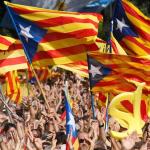 Spanish Prime Minister Mariano Rajoy on Wednesday gave the Catalan government eight days to drop an independence bid, failing which he would suspend the Catalonia’s political autonomy and rule the region directly, Reuters reported.
Spanish Prime Minister Mariano Rajoy on Wednesday gave the Catalan government eight days to drop an independence bid, failing which he would suspend the Catalonia’s political autonomy and rule the region directly, Reuters reported.
His move could deepen the confrontation between Madrid and the northeastern region but also signals a way out of Spain’s biggest political crisis since a failed military coup in 1981.
Rajoy would probably call a snap regional election after activating Article 155 of the constitution that would allow him to sack the Catalan regional government.
He later told Spain’s parliament the Catalan government had until Monday, October 16 at 0800 GMT to answer.

 The overwhelming majority of Catalans who participated in the banned referendum have voted in favor of independence from Spain, the Catalan government has announced.
The overwhelming majority of Catalans who participated in the banned referendum have voted in favor of independence from Spain, the Catalan government has announced.

